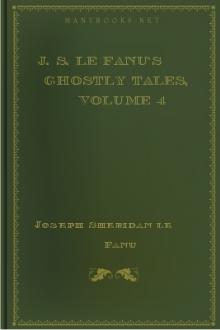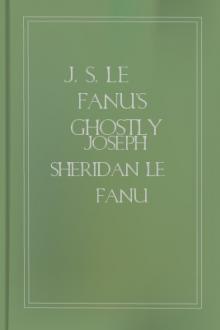J. S. Le Fanu's Ghostly Tales, Volume 4 - Joseph Sheridan Le Fanu (free ebook reader for iphone txt) 📗

- Author: Joseph Sheridan Le Fanu
- Performer: -
Book online «J. S. Le Fanu's Ghostly Tales, Volume 4 - Joseph Sheridan Le Fanu (free ebook reader for iphone txt) 📗». Author Joseph Sheridan Le Fanu
Its individuality attracted me. I grew fond of it for itself, and for its associations, until other associations of a hateful kind first disturbed, and then destroyed, their charm. I forgave its dull red brick, and pinched white windows, for the sake of the beloved and cheerful faces within: its ugliness was softened by its age; and its sombre evergreens, and moss-grown stone flower-pots, were relieved by the brilliant hues of a thousand gay and graceful flowers that peeped among them, or nodded over the grass.
Within that old house lay my life's treasure! I had a darling little girl of nine, and another little darling—a boy—just four years of age; and dearer, unspeakably, than either—a wife—the prettiest, gayest, best little wife in all London. When I tell you that our income was scarcely £380 a-year, you will perceive that our establishment cannot have been a magnificent one; yet, I do assure you, we were more comfortable than a great many lords, and happier, I dare say, than the whole peerage put together.
This happiness was not, however, what it ought to have been. The reader will understand at once, and save me a world of moralising circumlocution, when he learns, bluntly and nakedly, that, among all my comforts and blessings, I was an infidel.
I had not been without religious training; on the contrary, more than average pains had been bestowed upon my religious instruction from my earliest childhood. My father, a good, plain, country clergyman, had worked hard to make me as good as himself; and had succeeded, at least, in training me in godly habits. He died, however, when I was but twelve years of age; and fate had long before deprived me of the gentle care of a mother. A boarding-school, followed by a college life, where nobody having any very direct interest in realising in my behalf the ancient blessing, that in fulness of time I should "die a good old man," I was left very much to my own devices, which, in truth, were none of the best.
Among these were the study of Voltaire, Tom Paine, Hume, Shelley, and the whole school of infidels, poetical as well as prose. This pursuit, and the all but blasphemous vehemence with which I gave myself up to it, was, perhaps, partly reactionary. A somewhat injudicious austerity and precision had indissolubly associated in my childish days the ideas of restraint and gloom with religion. I bore it a grudge; and so, when I became thus early my own master, I set about paying off, after my own fashion, the old score I owed it. I was besides, like every other young infidel whom it has been my fate to meet, a conceited coxcomb. A smattering of literature, without any real knowledge, and a great assortment of all the cut-and-dry flippancies of the school I had embraced, constituted my intellectual stock in trade. I was, like most of my school of philosophy, very proud of being an unbeliever; and fancied myself, in the complacency of my wretched ignorance, at an immeasurable elevation above the church-going, Bible-reading herd, whom I treated with a good-humoured superciliousness which I thought vastly indulgent.
My wife was an excellent little creature and truly pious. She had married me in the full confidence that my levity was merely put on, and would at once give way before the influence she hoped to exert upon my mind. Poor little thing! she deceived herself. I allowed her, indeed, to do entirely as she pleased; but for myself, I carried my infidelity to the length of an absolute superstition. I made an ostentation of it. I would rather have been in a "hell" than in a church on Sunday; and though I did not prevent my wife's instilling her own principles into the minds of our children, I, in turn, took especial care to deliver mine upon all occasions in their hearing, by which means I trusted to sow the seeds of that unprejudiced scepticism in which I prided myself, at least as early as my good little partner dropped those of her own gentle "superstition" into their infant minds. Had I had my own absurd and impious will in this matter, my children should have had absolutely no religious education whatsoever, and been left wholly unshackled to choose for themselves among all existing systems, infidelity included, precisely as chance, fancy, or interest might hereafter determine.
It is not to be supposed that such a state of things did not afford her great uneasiness. Nevertheless, we were so very fond of one another, and in our humble way enjoyed so many blessings, that we were as entirely happy as any pair can be without the holy influence of religious sympathy.
But the even flow of prosperity which had for so long gladdened my little household was not destined to last for ever. It was ordained that I should experience the bitter truth of more than one of the wise man's proverbs, and first, especially, of that which declares that "he that hateth suretyship is sure." I found myself involved (as how many have been before) by a "d—d good-natured friend," for more than two hundred pounds. This agreeable intelligence was conveyed to me in an attorney's letter, which, to obviate unpleasant measures, considerately advised my paying the entire amount within just one week of the date of his pleasant epistle. Had I been called upon within that time to produce the Pitt diamond, or to make title to the Buckingham estates, the demand would have been just as easily complied with.
I have no wish to bore my reader further with this little worry—a very serious one to me, however—and it will be enough to mention, that the kindness of a friend extricated me from the clutches of the law by a timely advance, which, however, I was bound to replace within two years. To enable me to fulfill this engagement, my wife and I, after repeated consultations, resolved upon the course which resulted in the odd and unpleasant consequences which form the subject of this narrative.
We resolved to advertise for a lodger, with or without board, &c.; and by resolutely submitting, for a single year, to the economy we had prescribed for ourselves, as well as to the annoyance of a stranger's intrusion, we calculated that at the end of that term we should have liquidated our debt.
Accordingly, without losing time, we composed an advertisement in the most tempting phraseology we could devise, consistently with that economic laconism which the cost per line in the columns of the Times newspaper imposes upon the rhetoric of the advertising public.
Somehow we were unlucky; for although we repeated our public notification three times in the course of a fortnight, we had but two applications. The one was from a clergyman in ill health—a man of great ability and zealous piety, whom we both knew by reputation, and who has since been called to his rest. My good little wife was very anxious that we should close with his offer, which was very considerably under what we had fixed upon; and I have no doubt that she was influenced by the hope that his talents and zeal might exert a happy influence upon my stubborn and unbelieving heart. For my part, his religious character displeased me. I did not wish my children's heads to be filled with mythic dogmas—for so I judged the doctrines of our holy faith—and instinctively wished him away. I therefore declined his offer; and I have often since thought not quite so graciously as I ought to have done. The other offer—if so it can be called—was so very inadequate that we could not entertain it.
I was now beginning to grow seriously uneasy—our little project, so far from bringing in the gains on which we had calculated, had put me considerably out of pocket; for, independently of the cost of the advertisement I have mentioned, there were sundry little expenses involved in preparing for the meet reception of our expected inmate, which, under ordinary circumstances, we should not have dreamed of. Matters were in this posture, when an occurrence took place which immediately revived my flagging hopes.
As we had no superfluity of servants, our children were early obliged to acquire habits of independence; and my little girl, then just nine years of age, was frequently consigned with no other care than that of her own good sense, to the companionship of a little band of playmates, pretty similarly circumstanced, with whom it was her wont to play. Having one fine summer afternoon gone out as usual with these little companions, she did not return quite so soon as we had expected her; when she did so, she was out of breath, and excited.
"Oh, papa," she said, "I have seen such a nice old, kind gentleman, and he told me to tell you that he has a particular friend who wants a lodging in a quiet place, and that he thinks your house would suit him exactly, and ever so much more; and, look here, he gave me this."
She opened her hand, and shewed me a sovereign.
"Well, this does look promisingly," I said, my wife and I having first exchanged a smiling glance.
"And what kind of gentleman was he, dear?" inquired she. "Was he well dressed—whom was he like?"
"He was not like any one that I know," she answered; "but he had very nice new clothes on, and he was one of the fattest men I ever saw; and I am sure he is sick, for he looks very pale, and he had a crutch beside him."
"Dear me, how strange!" exclaimed my wife; though, in truth there was nothing very wonderful in the matter. "Go on, child," I said; "let us hear it all out."
"Well, papa, he had such an immense yellow waistcoat!—I never did see such a waistcoat," she resumed; "and he was sitting or leaning, I can't say which, against the bank of the green lane; I suppose to rest himself, for he seems very weak, poor gentleman!"
"And how did you happen to speak to him?" asked my wife.
"When we were passing by, none of us saw him at all but I suppose he heard them talking to me, and saying my name; for he said, 'Fanny—little Fanny—so, that's your name—come here child, I have a question to ask you.'"
"And so you went to him?" I said.
"Yes," she continued, "he beckoned to me, and I did go over to him, but not very near, for I was greatly afraid of him at first."
"Afraid! dear, and why afraid?" asked I.
"I was afraid, because he looked very old, very frightful, and as if he would hurt me."
"What was there so old and frightful about him?" I asked.
She paused and reflected a little, and then said—
"His face was very large and pale, and it was looking upwards: it seemed very angry, I thought, but maybe it was angry from pain; and sometimes one side of it used to twitch and tremble for a minute, and then to grow quite still again; and all the time he was speaking to me, he never looked at me once, but always kept his face and eyes turned upwards; but his voice was very soft, and he called me little Fanny, and gave me this pound to buy toys with; so I was not so frightened in a little time, and then he sent a long message to you, papa, and told me if I forgot it he would beat me; but I knew he was only joking, so that did not frighten me either."
"And what was the message, my girl?" I asked, patting her pretty head with my hand.
"Now, let me remember it all," she said, reflectively; "for he told it to me twice. He asked me if there was a good bedroom at the top of the house, standing by itself—and you know there





Comments (0)